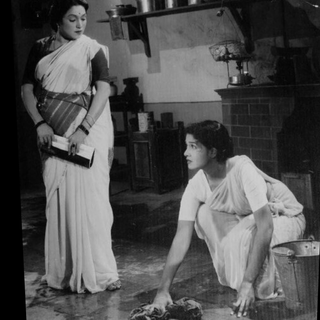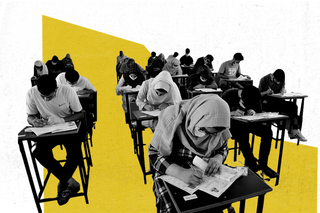
NEET Medical Exams Will Harm Tamil Nadu Healthcare: Panel Report
Since its introduction in 2017, the NEET medical entrance exam led to many student suicides in Tamil Nadu, calling for its elimination.

Days after Tamil Nadu witnessed the third death by suicide attributed to the National Eligibility cum Entrance Test (NEET), a panel released a damning report about the medical entrance examination. The government publicly released the Justice A K Rajan panel — constituted to study the impact of NEET — report on Monday.
NEET is a standard entrance test for admission into medical colleges. The panel found that before NEET, more students from Tamil-medium schools achieved medical seats. After the government introduced NEET in 2017, this changed. Data shows that post-NEET, government, and Tamil-medium schools faced a disproportionate disadvantage.
In the four years since NEET’s introduction, many young students have died by suicide in Tamil Nadu. The death of a student named Anitha catalyzed widespread protests in the state. Anitha was from a Scheduled Caste community who had secured top marks in her board examinations. Before NEET, her 12th standard marks would have earned her admission to medical colleges. But the typical entrance test cut-off and the rank-based admission criteria, failed Anitha. She had studied in a Tamil-medium school and would have been the first from her village to become a doctor had it not been for the exam.
Data confirms that marginalized students fared poorly post-NEET. Government school students comprised 14% of MBBS admissions pre-NEET; post-NEET, this figure dropped to a paltry 1.7%. Similarly, Tamil-medium students went from comprising nearly 20% of admissions to 1.6%.
On the other hand, English-medium students comprised 80% to 98.71% pre and post-NEET respectively.
Related on The Swaddle:
The stark divide in numbers shows that the smaller share that Tamil-medium and government school students had to begin with, has dwindled to a nominal size. This divide amounts to systemic discrimination. Those who oppose the exam argue that it further entrenches exclusion in education and stalls social progress. Marginalized students like Anitha dream of becoming doctors, but standardized tests have an implicit bias that shatters these dreams. The three NEET aspirants who died this month came from families involved in farm or daily wage labor.
The exclusion also has ramifications beyond students’ mental health and aspirations. The Rajan panel stated that the rural and urban poor would be unable to join medical courses. “Ultimately, Tamil Nadu may go back to pre-independence days, wherein small towns and in villages only ‘barefoot doctors’ catering for the needs were available,” the report said. “Tamil Nadu as a state would go down in the rank among States, in the Medical and Healthcare system.” In other words, there would be fewer doctors in Primary Health Centers and other government health services.
The report’s findings further refute the Supreme Court’s argument in favor of NEET 2017 that there could be “no compromise on intellect.” More than 90% of those who had cleared NEET had access to expensive coaching classes. “Since learning is lost and test-taking training is focused (upon), the future doctors cannot think but apply their intellectual and reasoning disposition in their profession, and eventually they become an extended machine in the healthcare system,” the report noted.
Further, students from more privileged backgrounds can pay steep admission costs despite a low NEET rank: an option that is unavailable to the vast majority of poorer students. As a result: “What had happened during the NEET period is exactly the opposite of what the Committee had wished for. Students who can afford to pay such an exorbitant fee have the opportunities more than those who cannot pay.”
Related on The Swaddle:
There Is No Such Thing as Achievement Through Pure Merit
Another finding was that the share of students from localities with a high Human Development Index (HDI) surged post-NEET. The surge suggests that NEET “created a generation of doctors and teaching faculties from mainly the privileged communities — the affluent, the creamy, the urban genre — who are well away from the grass root realities of the diverse social structure.”
Hence, healthcare in the state could worsen, and the poorest will suffer.
The committee recommended that the government eliminate the exam. “This will ensure social justice and protect all vulnerable student communities from being discriminated against in admission to medical education programs,” the report states. Last week, the Tamil Nadu government passed a Bill to exempt the state from incorporating NEET.
Another noteworthy recommendation is creating an ‘Adversity Score‘ that would account for the number of adversities students face during the admission process. At present, the committee concluded, NEET is “against” disadvantaged groups like Most Backward Classes (MBC), SC, and ST communities or those from poorer or rural backgrounds. Furthermore, the report highlights the importance of diversity in achieving better health outcomes.
“If medical education is to be affordable to and accessible by all people, it will not be possible without a fair and equitable admission process and criteria and a proper fee regulation. Contrary to this, the National Eligibility cum Entrance Test (NEET) does not seem to help achieve the much-required diversity.”
Notably, the report also invoked B.R. Ambedkar, who said, “examination is something quite different from education, but in the name of raising the standard of education, they are making the examinations so impossible and so severe that the backward communities which have hitherto not had the chance of entering the portals of University are absolutely kept out.”
Rohitha Naraharisetty is a Senior Associate Editor at The Swaddle. She writes about the intersection of gender, caste, social movements, and pop culture. She can be found on Instagram at @rohitha_97 or on Twitter at @romimacaronii.
Related


Can’t Let Go: Of the Self‑Growth in ‘Aisha,’ Despite the Bratty Rich Girl
